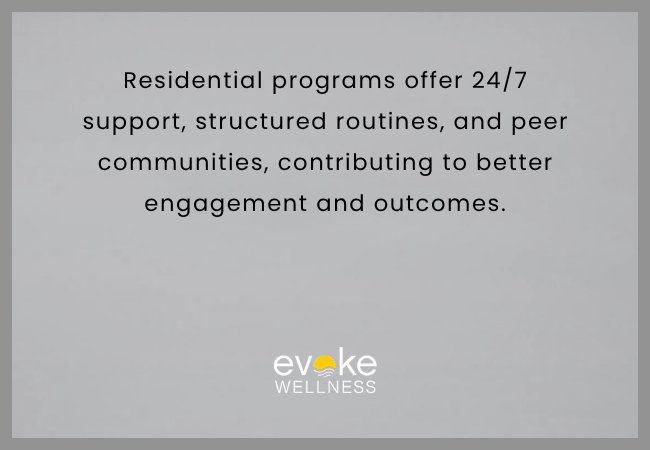Addiction is complex. It touches every part of a person’s life—mental, emotional, physical, and social. Because of this, the recovery process must be just as comprehensive. For individuals in Ohio struggling with substance use and mental health challenges, residential rehab offers an immersive, life-changing opportunity to build a new foundation. At Evoke Wellness at Hilliard, this foundation is strengthened by clinical excellence, compassionate care, and an unwavering commitment to safety and stability.
Residential rehab provides the structure and support needed for deep healing. It’s not just about stopping substance use; it’s about reclaiming control, rebuilding identity, and restoring hope. Being surrounded by professionals and peers who understand addiction offers more than treatment—it creates a community of healing, one day at a time.
Why Environment Matters in Recovery
The environment in which recovery begins can significantly influence long-term outcomes. For many, the stressors of daily life—work pressures, unstable home settings, toxic relationships, or even access to substances—can make sobriety nearly impossible to sustain. Residential rehab removes these external challenges, placing clients in a nurturing, structured setting that supports internal growth.
In a setting free from distractions, individuals can fully focus on their recovery. They are no longer just surviving—they are healing. The consistency of schedules, presence of professional support, and sense of community provide safety not just in the physical sense, but emotionally as well. People feel seen. They feel safe. And most importantly, they begin to believe change is possible.
Clients who enter an Intensive Inpatient Treatment Program in Ohio are met with this type of supportive and clinically intensive care. Here, recovery isn’t an afterthought. It’s the central mission, supported by both individualized and group-based therapeutic efforts designed to address the deeper causes of addiction.
Medical Stabilization and Safe Withdrawal
For many, the first days of sobriety are physically demanding. Depending on the substance, withdrawal symptoms can be uncomfortable—or even life-threatening—without medical oversight. That’s why residential treatment often begins with a carefully managed detoxification process that ensures safety, comfort, and support around the clock.
A person detoxing from opioids, benzodiazepines, alcohol, or stimulants may experience a variety of symptoms: insomnia, anxiety, nausea, hallucinations, and seizures. In such cases, a medically monitored environment is essential. Clients entering care through a Drug Detox Center in Ohio receive 24/7 medical supervision, stabilization services, and the right medications to reduce withdrawal discomfort and risk.
Once detox is complete, individuals are ready to engage in therapeutic work. Starting this next phase in a setting where they already feel physically and emotionally safe sets the tone for lasting progress.
Integrated Mental Health Support
Addiction rarely exists in isolation. For many people, it is closely linked with underlying mental health challenges such as depression, anxiety, trauma, or personality disorders. In these cases, successful recovery depends on addressing both issues at the same time.
When left untreated, mental health symptoms can drive a person back toward substance use. But when therapy, psychiatry, and addiction treatment are integrated, clients begin to understand the full picture of their struggles—and the pathway to healing becomes much clearer.
Participating in a Dual Diagnosis Treatment Program in Ohio ensures individuals receive both behavioral health therapy and addiction counseling. At Evoke Wellness at Hilliard, our clinical teams work collaboratively to uncover and treat the root causes of suffering. It’s not just about managing symptoms; it’s about empowering clients with new ways of thinking, coping, and living.
This dual approach is particularly helpful for those who have tried recovery before but struggled to stay sober. Understanding how emotional distress and unresolved trauma contribute to relapse gives people the tools to break the cycle and sustain their progress.
Building Emotional Resilience Through Therapy
Addiction often strips individuals of their self-worth and identity. It fosters shame, secrecy, and disconnection. Therapy helps rebuild those broken pieces by creating space to explore feelings, develop coping skills, and rediscover purpose.
In residential rehab, clients engage in multiple therapeutic modalities designed to promote self-awareness, emotional regulation, and behavioral change. These include individual therapy, group counseling, family sessions, and skill-building workshops. Over time, clients begin to reconnect with who they are—not just who they were in active addiction.
This healing process is especially important for individuals receiving care in a Mental Health Treatment Center in Ohio. Conditions like PTSD, bipolar disorder, or severe anxiety require specialized interventions and trauma-informed care. The emotional safety of residential treatment allows clients to open up in ways they may never have before, laying the groundwork for a healthier future.
Daily life in residential rehab is designed to support full-person healing. From sunrise to bedtime, every activity is intentional. Clients may start the morning with mindfulness practices, followed by therapy sessions, holistic workshops, and peer discussion groups. Meals are structured and nutritious, downtime is restorative, and evenings often involve reflection or 12-step meetings.
This consistency brings clarity. Clients begin to understand how their past experiences, thoughts, and habits have shaped their relationship with substances. They also learn how to build healthier patterns—ones rooted in connection, self-care, and self-compassion.
An often-overlooked benefit of residential care is that it fosters long-term thinking. When someone is removed from chaos and given the space to slow down, they begin to think beyond crisis management. They start setting goals—rebuilding relationships, returning to school, securing stable employment—and believing in their ability to reach them.
Part of this progress also involves preparation for life beyond the treatment facility. Discharge planning is an integral part of the recovery process at Evoke Wellness at Hilliard. Long before a client completes the program, the care team begins creating a roadmap that includes outpatient therapy, support groups, sober living options, and connections to resources in the community.
Clients transitioning from a Residential Treatment Center in Ohio are never left to navigate post-treatment life alone. Ongoing connection with alumni programs, case managers, and clinicians helps maintain momentum and accountability long after discharge. This continuity of care is critical to preventing relapse and promoting long-term wellness.
In some cases, detox needs may be specific to alcohol. For individuals at risk of severe alcohol withdrawal symptoms—such as delirium tremens or seizures—an Alcohol Detox Center in Ohio provides essential stabilization, comfort medications, and around-the-clock care. This level of support is especially vital for individuals who have been drinking heavily for extended periods or who have tried to quit before and relapsed.
Why Choose Us
At Evoke Wellness at Hilliard, we believe everyone deserves a safe place to heal. As a licensed Residential Treatment Center in Ohio, we offer a full continuum of care—from detox to therapy to aftercare coordination—rooted in evidence-based practices and genuine compassion.
Our facility combines the warmth of a healing environment with the professionalism of expert clinicians, providing a space where recovery feels not just possible, but sustainable. Every client’s journey is unique, and we meet each person with respect, dignity, and unwavering support.
Conclusion
Residential rehab is more than a program—it’s a lifeline. For those ready to leave behind the chaos of addiction and embrace a new way of living, it offers everything that early recovery demands: stability, structure, community, and clinical support. It’s a place where healing can begin, goals can be reclaimed, and hope can be restored.
At Evoke Wellness at Hilliard, our mission is to provide that place for every individual who walks through our doors. Healing doesn’t happen overnight, but with the right support, the journey can begin today—one step, one moment, and one breakthrough at a time.
Frequently Asked Questions (FAQs)
What is residential rehab, and how does it help with addiction recovery?
Residential rehab is a structured, live-in treatment program that provides 24/7 support for individuals recovering from substance use. It removes people from potentially triggering environments, allowing them to focus entirely on healing through therapy, medical care, and support.
How long does a typical residential rehab program last?
Length varies depending on individual needs, but most residential rehab programs range from 30 to 90 days. Some individuals may stay longer based on the severity of addiction or mental health conditions being treated.
Is residential treatment effective for co-occurring mental health disorders?
Yes, many residential rehabs—including Evoke Wellness at Hilliard—offer dual diagnosis care, which means both substance use and underlying mental health conditions are treated together for more effective outcomes.
What should I expect during the first few days of residential rehab?
The first few days often include medical assessments, detox if needed, and meeting your clinical team. Clients are introduced to their daily schedule, which may include therapy sessions, group counseling, and wellness activities.
How does Evoke Wellness at Hilliard support long-term recovery after treatment ends?
Evoke Wellness provides personalized discharge planning that connects clients to outpatient care, sober living, support groups, and alumni programs to ensure ongoing support after leaving residential treatment.



